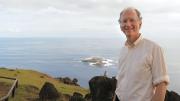On a recent trip to Easter Island, Oceana CEO Andy Sharpless ’77, J.D. ’86, took a hike along the coast. The conservation group he runs has helped overhaul national laws to better protect marine life throughout Chile’s coastal waters and fisheries—and is now pushing to curb overfishing around the famous island, a Chilean special territory.
It is the most isolated inhabited place on earth, where hundreds of tourists nevertheless arrive daily to see the famous carved-stone human figures, called moai, that dot the landscape. The ancient statues are impressive, Sharpless says. But so are signs of the island’s current environmental problems—and its historic legacy as a man-made ecological disaster. “No fish jumped out of the water,” Sharpless notes. The once abundant forests and plant life are long gone, along with the island’s important role as a major rookery for seabirds. During a 12-mile hike over scrubby ground strewn with volcanic rocks, “We saw only two tiny forests, maybe a half-acre each,” Sharpless says. “We also saw two birds, neither of which was native: they were raptors introduced at some point to kill the rat population that the Polynesian colonists brought with them in the tenth century. The only other wildlife were horses and cows and three dogs.”
Oceana, based in Washington, D.C., believes the world’s oceans “are in crisis from overfishing, acidification, and habitat destruction [and] works internationally to alleviate these and other problems through policy-oriented campaigns.” The nonprofit group has a $20-million annual budget, about 130 employees, a team in Chile, and eight other overseas offices. (In addition to Sharpless, three other alumni are also involved: president Jim Simon, J.D. ’83, assistant general counsel Eric Bilsky, J.D. ’91, and board member María Eugenia Girón, M.B.A. ’92.) Its goals extend from banning the shark-fin trade and requiring seafood traceability in the United States to overhauling the European Union’s fisheries policy, preventing offshore oil drilling in Belize (and elsewhere), and saving specific endangered marine species and habitats, such as the Steller sea lion in Alaska. Earlier this year, Oceana publicized its “seafood fraud” investigation, which found that one-third of the seafood sold to American consumers was mislabeled. The results, Sharpless wryly notes, got more media attention than Oceana’s fight against oil drilling during the year that “BP was ruining the Gulf of Mexico, proving that people care more about what goes in their stomachs.”
The fraud investigation supports Oceana’s push for a national system that tracks fish from “boat to plate”; Sharpless says that would reduce illegal fishing significantly. Bills to require such a system are pending in both the House and the Senate, and the American fishing fleet, he reports, agrees, for a change, with Oceana’s efforts “because they see themselves as more law-abiding than the foreign fleets.” (“More often,” he adds, “we are fighting with them.”)
Oceana focuses on influencing the laws of the nine countries, plus the European Union, that together control two-thirds of the world’s marine fish production. Seven out of eight fish are caught within 200 nautical miles of the coast in an “exclusive economic zone” controlled by the closest country; Peru, China, the United States, Russia, and Indonesia lead the pack. Sharpless outlines the workings of the global fishing industry as part of his first book, The Perfect Protein: The Fish Lover’s Guide to Saving the Oceans and Feeding the World (Rodale), published in May. The rest are nabbed in the “high seas” controlled by committees such as the International Commission for the Conservation of Atlantic Tuna (ICCAT)—which Sharpless says is more commonly known in the industry as the commission “to Catch All Tuna.” It is much harder to change fishing operations at that level, he adds, because committees “tend to make decisions by consensus, which means they arrive at the lowest common denominator—and very often do not even enforce that.” By contrast, the top fishing countries, he says, “generally have the capability, if they choose to do it, to manage their fisheries well and to make them abundant forever.”
The Perfect Protein promotes eating more fish because Sharpless believes, along with many others, that it’s healthy for the brain, the body, and the world. Choosing meat or poultry instead, he argues, directly affects the demand for grain, which leads in turn to further deforestation and loss of biodiversity; the oceans, which cover 71 percent of the planet, can still recover, despite current pollution and overfishing. The concise book, with a foreword by former president Bill Clinton, gives a general audience guidance on “eating responsibly,” along with 21 “sustainable” recipes from renowned chefs, and a fine selection of further readings.
Sharpless loves the challenge and sense of integrity in public-advocacy work. A birthright Quaker, he was raised in Philadelphia and finds compelling “the idea that Quakers are radical and definitive about your responsibility for your own moral judgment. You are not to be a follower,” he says. “You own your own life, conscience, and moral decisionmaking.”
He cannot tolerate ineffectiveness or waffling. “I am very nonmystical, very hardheaded,” he asserts—and a devoted player of competitive sports, even though he didn’t come close to varsity: “I think I got to play two minutes for Harvard’s freshman soccer team, all year.”
For the last 12 years, he has held an annual “Gameboy Weekend” at his summer house on Chesapeake Bay, to which about 30 male friends between 34 and 65 (including Harvard buddies) eagerly flock. They play softball and tennis (with rules changed “to make them better, in my opinion,” he says), along with his own complex creations. In “blind replica,” for example, teams are challenged to “ replicate a structure [using Tinkertoys® or Legos®] that you cannot see, based on advice from a teammate who can see the original, but not the replication.” The final products are put on display and critiqued. “There’s an elaborate point system,” he says, “and everyone gets ranked.”
Although his career path may seem nonlinear, evidence of his drive—and innovation—is everywhere. In a formative experience just after college, the economics concentrator worked as a consumer-rights organizer under Ralph Nader, LL.B. ’58, and led the state-level campaign that established the first citizens’ utility board, in 1979 in Wisconsin. “Amazingly—we won!” he says, just as happy about it now. He went on to the London School of Economics, law school, and then to McKinsey & Company for five years before pursuing a longstanding interest in mass media in a job at the Museum of Television and Radio. Along the way, he and Beth Inabinett married. She is a volunteer coordinator at another nonprofit, Ashoka, and the couple have two daughters, now in their twenties.
In 1994, Sharpless took a calculated risk and joined the leadership team of a fledgling, pre-“Internet boom” software firm, Progressive Networks, that ultimately became the first company to develop and commercialize streaming audio and video, and then encouraged the technology for use in online activism. By the time he left, in 1997, to become executive vice president of the Discovery Channel’s Internet division, the company had grown to 300 employees and was well on its way toward a public offering.
In 2003, Sharpless was hired to lead Oceana, then barely a year old. The organization was begun by five ocean-conservation philanthropies, including the Pew Charitable Trusts and the Oak Foundation of Geneva and is still primarily funded by such groups. At the time, he knew little about oceans, but he liked the immense environmental challenge—and potentially world-changing rewards. “In college, I had a long list of ways in which I thought the world could be improved,” he says, smiling. And he still does. But he wouldn’t take the job without assurances of clear, businesslike goals. “We have specific campaigns with measurable outcomes: we win or we lose,” he says. “And we are very effective, if we don’t spread ourselves too thin.”
Much of its conservation effort entails protracted litigation. Five years of work in Chile (seventh on the list of top fish-catchers), for example, led to national laws being “rewritten in 2012 to mandate that fishing quotas be based on scientifically set limits and that habitats be protected, including 118 seamounts [submerged mountains that are important oceanic ecosystems] that are now off-limits to bottom-trawling,” Sharpless explains. Also required is that bycatch (fish caught unintentionally and in many cases discarded) be limited and managed by independent observers on all large commercial vessels.
This spring, Oceana forestalled off-shore oil drilling in Belize by challenging the legality of the government’s awarding of leases “on 100 percent of its ocean to oil companies without seriously managing the risk of that activity,” Sharpless reports. (Among those working pro bono on the case is Rebekah Lacey, J.D. ’08.) “We won at the trial-court level, validating what we’ve been saying for two and a half years,” he adds. “The Belize government plans to appeal that decision, however. And so the battle continues.”
Resistance to fishing restrictions also looms on Easter Island. Oceana wants to triple the size of an already established 150,000-square-kilometer “no-take” fish reserve (the fourth-largest of its kind in the world) around a neighboring island, Salas y Gomez. Especially critical to restoring the region’s fish population is conserving the chain of seamounts between the two islands. Separately, Oceana is in discussions with the indigenous people, the Rapa Nui, about prohibiting industrial fishing (vessels more than 18 meters long) within a 200-mile zone around Easter Island “in a way,” Sharpless says, “that does not offend their ancestral fishing rights.” The rapid decline of tuna, sharks, and other big fish is primarily due to industrial fishing, particularly from illegal foreign fleets, according to Oceana. As a result, in an ironic scenario, the majority of island businesses are importing tuna from Tahiti to feed tourists, whose money, in turn, sustains the local economy. The proposed restrictions would “help regenerate fish populations over time,” Sharpless says, “and spur an artisanal fishing fleet of the Rapa Nui.”
The Rapa Nui are conflicted about accepting any limits, a situation complicated by the economic gains and the wish for more autonomy at the provincial level. “We are in a pre-existing, complicated political environment,” Sharpless concedes. “I don’t know whether we’re going to win there. But I think we have a good chance.” Oceana hopes that Chilean president Sebastián Piñera acts within a typically nonpoliticized time frame: after this November’s presidential election and before March 2014, when he leaves office.
This May, Sharpless’s Gameboy Weekend also featured a Saturday night discussion, over drinks, of life’s lessons. The question posed was: What do you know to be true now that you didn’t believe when you were younger? At 20, Sharpless believed good intentions led to good outcomes. Environmental work has shown him otherwise: “Pure-of-heart incompetence is a very dangerous thing,” he asserts. “You are going to create problems for yourself and the world if you don’t know what you are doing.”
The history of Easter Island’s ecological demise is well known. (A good account appears in Collapse: How Societies Choose to Fail or Succeed, by Jared Diamond ’58, JF ’65.) Even before Europeans arrived, the rats that came with the original Polynesian settlers “were devouring the seeds of the future forests, and the forests were being cut down to plant sweet potato fields,” he explains. By the time Dutch explorer Jacob Roggeveen got there, on Easter morning in 1722, “the place was already in rapid decline, with anarchy, disorder, starvation, and signs of cannibalism.” The risks and results of environmental ruin were probably as clear to Roggeveen then as they should be to modern observers, he adds. “This is what you get when you have shortsighted overuse of natural resources: a collapse that is ugly and disadvantageous for civilization.”
Still, there is hope, he insists. The oceans are surprisingly resilient and, with help, can regenerate. Oceana predicts that the changes in Chile, and those proposed for Easter Island, mean that within five to 10 years, “people will be hiking and seeing more fish. More people will be fishing off the island,” he adds, “and bringing a healthy dinner home for their families.”








